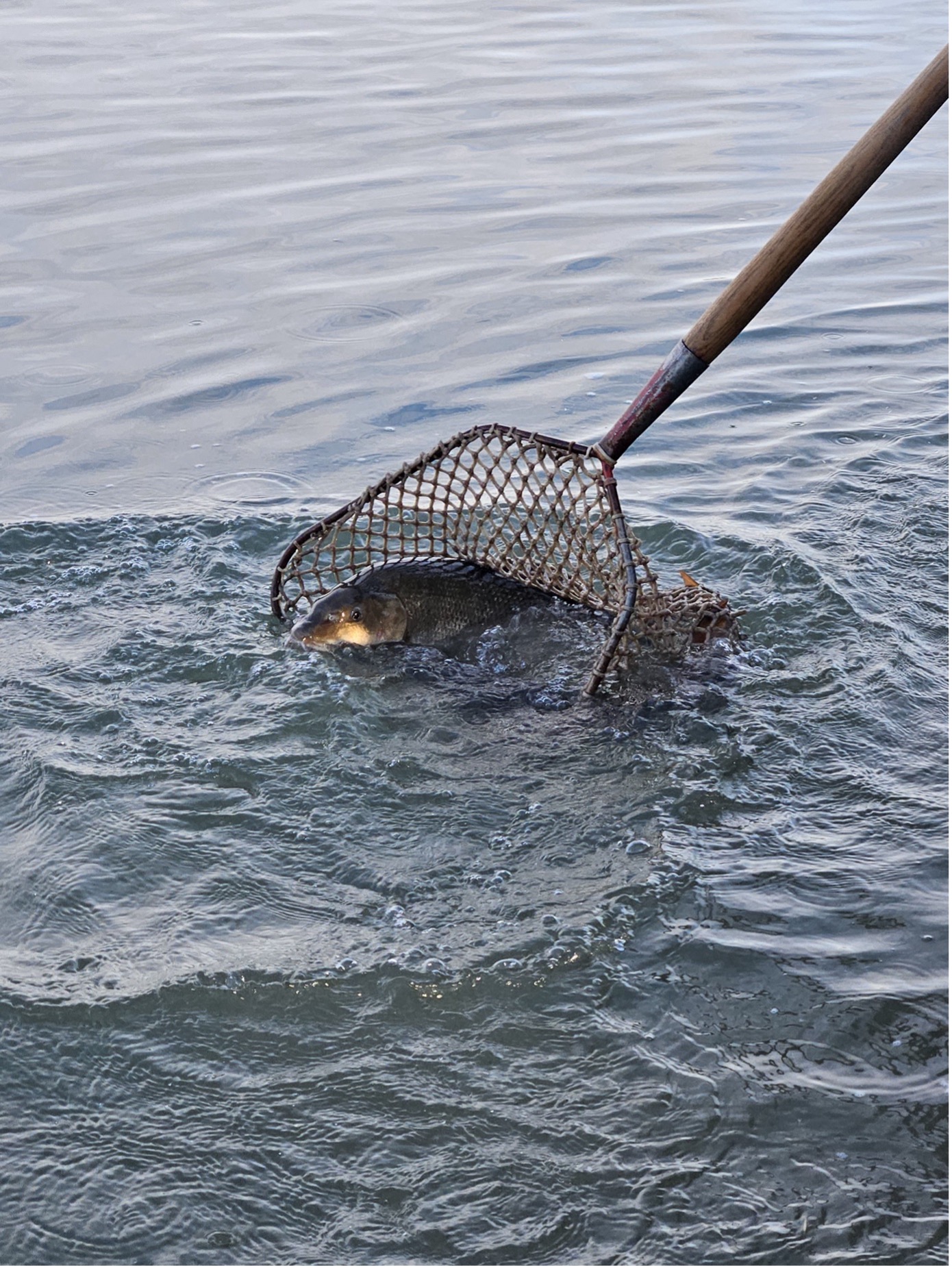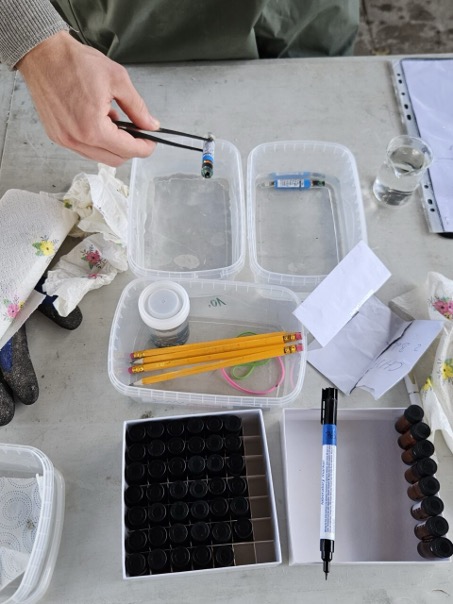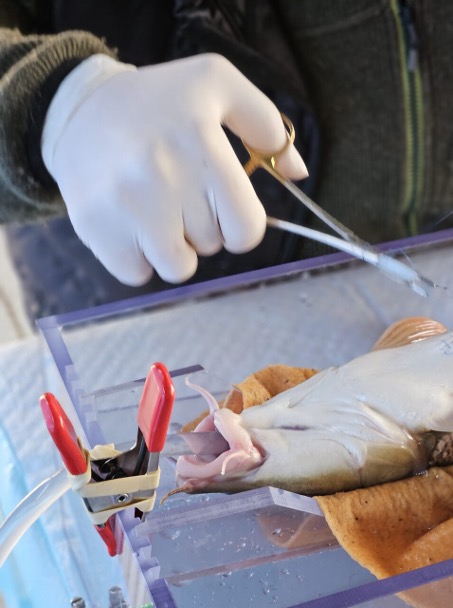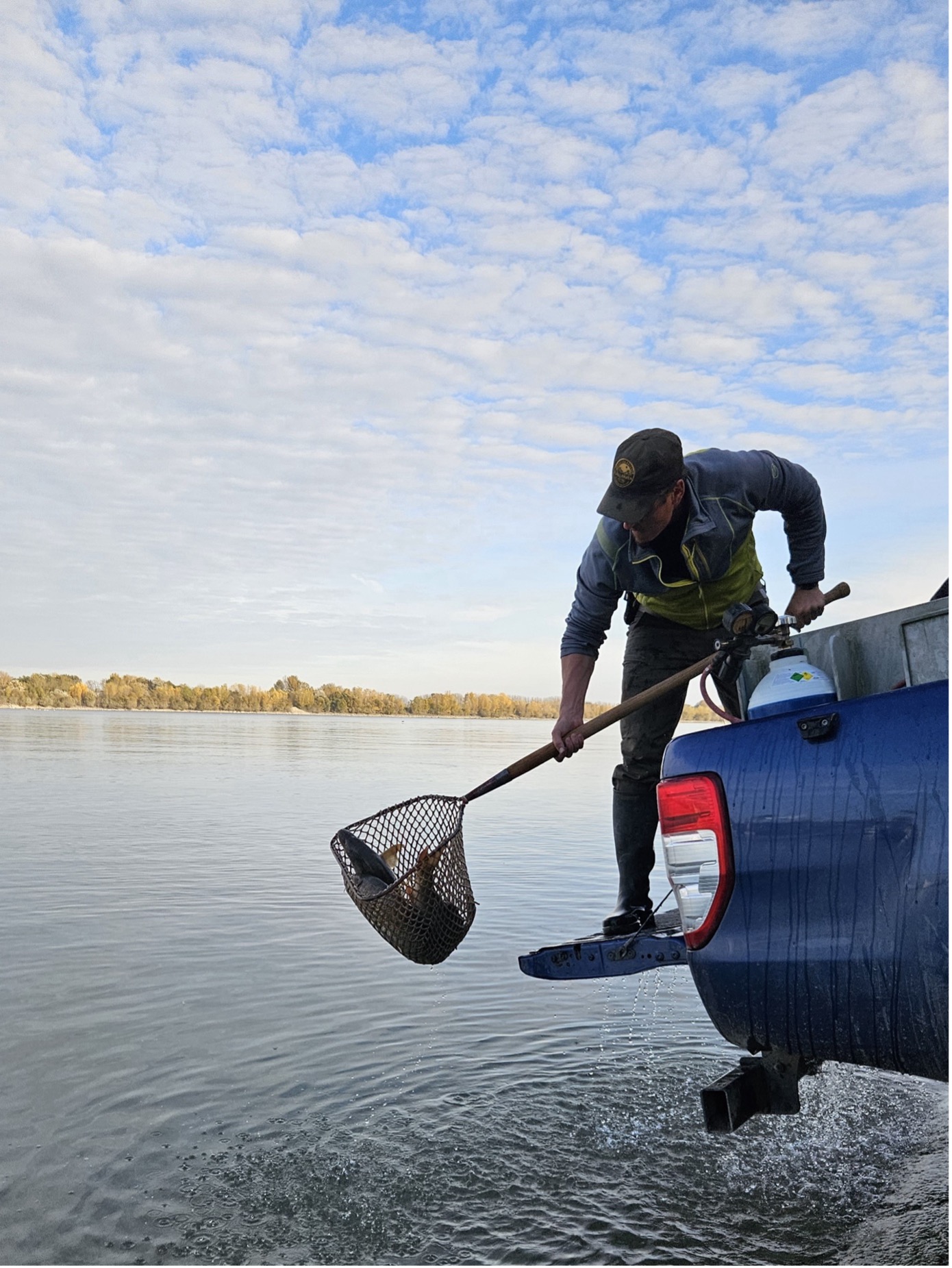On August 26-29, 2024, FFPW USB staff (Bořek Drozd, Jan Kubec, Martin Vlk) performed dowmloading of data from telemetry gates installed on water structures and in free-flowing passages in the Slovak-Hungarian part of the Danube in order to determine the migration activity of the sterlet (Acipenser ruthenus) in the project area of the integrated LIFE project Living Rivers (101069837/LIFE21-IPE-SK-Living Rivers). Furthermore, maintenance, service and repair of the installed telemetry equipment was carried out.
Written by: RNDr. Bořek Drozd, Ph.D.
Business Visit to MAT-KULING and Future Fish Asia Exhibition & Conference (Izmir, Turkey October 9th – 13th, 2024)
The purpose of this business trip was to visit Future fish Asia exhibition and conference and MAT-KULING factory, a leading equipment manufacturer for Recirculating Aquaculture Systems. Visit aimed to strengthen relationships, explore opportunities, and attend seminars and presentations focused on the future of RAS technology.
The seminar sessions were highly informative, covering topics such as:
- Growth Potential for RAS in the US presented by Edward Aneshansley (Eda-Aquatic Design Services).
- Innovative Technology Development at Nofima Norway focusing on CO2 degassing and electrical biofiltration, presented by Kevin Torben Stiller (Nofima).
- Combining RAS with Outdoor Pond Fish Culture: Advantages and Risks, where I had the opportunity to present the ongoing research.
- Closing the Knowledge Gap in the RAS Industry by Jonas Junker (Bengtsen, Founder, IfAqua ApS)
- BalticWaters Fish Lab: A New Cold Water Fish Laboratory by Konrad Stralka (BalticWaters)
- Improvements in Fish Production with MAT-KULING Products by Simon Durejka (Swiss Lachs).
I would like to express my sincere gratitude to Vít Profant, Team Leader at MAT-KULING AS in Bodø, Nordland, Norway, for kindly inviting and hosting me during this event.
- Fotogalerie:
- Foto:
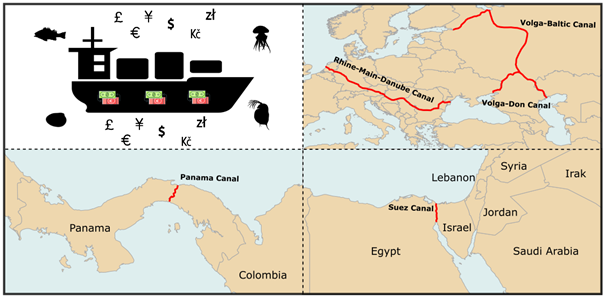
Aquatic invasive species are a major threat to biodiversity, but also the economy. One of the factors facilitating their spread is the construction of canals that connect two previously separated seas. In our paper, we quantified for the first time the economic costs of invasive species facilitated by the three globally most important canals (Suez, Panama, and European Inland Canals) using the most comprehensive database on the economic costs of invasive alien species worldwide (InvaCost).
Despite the high number of invasive species listed to have been facilitated in their introduction and spread by these canals, only for five of them economic costs were reported: the fishhook waterflea Cercopagis pengoi and the zebra mussel Dreissena polymorpha for the European Inland Canals, and the silver-cheeked toadfish Lagocephalus sceleratus, the lionfish Pterois miles, and the nomad jellyfish Rhopilema nomadica for the Suez Canal. However, these species alone accounted for a total cost of $42.2 million ($33.6 for European Inland Canals and $8.6 for Suez, while no costs were reported for the Panama Canal). Considering the high number of ecologically problematic invasive species spreading in these regions, it is obvious that their socioeconomic damage remains almost entirely unknown.
More detailed information can be found in the original article: Balzani, P., Cuthbert, R.N., Briski, E., Galil, B., Castellanos-Galindo, G.A., Kouba, A., Kourantidou, M., Leung, B., Soto, I., Haubrock, P.J., 2022. Knowledge needs in economic costs of invasive species facilitated by canalisation. NeoBiota 78, 207–223. https://doi.org/10.3897/neobiota.78.95050.
Written by: Paride Balzani, Ph.D.
Photo source: EVER_GIVEN_(49643352087).jpg (2934×1640) (wikimedia.org)
Within the implementation of the OP JAK, the project of development of the University of South Bohemia - ERDF quality, the infrastructure facilities of the South Bohemian Research Centre of Aquaculture and Biodiversity of Hydrocenoses (CENAKVA) will be modernized. Specifically, it involves the construction of two complete recirculating aquaculture systems (RAS) and one flow-through system located in a renovated hall on the premises of the Experimental Fish Culture Facility in Vodňany.
Each RAS will incorporate 18 rearing tanks with a uniform volume of 500 litres, a mechanical drum microscreen and biological filter, a pump assembly, influent and effluent piping and connection to an ozoniser for disinfection. The total volume of one RAS will be 15 m³ of water. The semi-flow system will be equipped with 10 rearing tanks with a uniform volume of 800 l, the system will be equipped with mechanical and biological filtration. The total volume of this system will be 12 m³ of water. An integral part of all systems will be a measurement and control system and connection to the existing backup power supply.
Construction work at the Faculty of Fisheries and Protection of Waters USB, Experimental Fish Culture Facility will start in June 2025 and implementation will last until October of the same year.
The project will be supported by a total of CZK 7 075 100,- excluding VAT.

V rámci realizace OP JAK, projektu Rozvoj JU - ERDF kvalita, dojde k modernizaci infrastrukturního zázemí Jihočeského výzkumného centra akvakultury a biodiversity hydrocenóz (CENAKVA). Konkrétně se jedná o výstavbu dvou kompletních recirkulačních akvakulturních systémů (RAS) a jednoho průtočného systému umístěných ve zrekonstruované hale v areálu Experimentálního rybochovného pracoviště a pokusnictví (ERPP) ve Vodňanech.
V každém RAS bude zakomponováno 18 ks odchovných nádrží o jednotném objemu 500 l, mechanický bubnový mikrosítový a biologický filtr, sestava čerpadel, přítokového a odtokového potrubí a připojení na desinfekci pomocí ozonizátoru. Celkový objem jednoho RAS bude 15 m³ vody. Semiprůtočný systém bude vybaven 10 ks odchovných nádrží o jednotném objemu 800 l, systém bude vybaven mechanickou a biologickou filtrací. Celkový objem tohoto systému bude 12 m³ vody. Nedílnou součástí všech systémů bude systém měření a regulace a napojení na stávající záložní zdroj el. energie.
Stavební práce na Fakultě rybářství a ochrany vod JU, Experimentálním rybochovném pracovišti a pokusnictví započnou v červnu 2025 a realizace potrvá do října téhož roku.
Celkem bude projekt podpořen částkou: 7 075 100,- Kč bez DPH.

- Fotogalerie:
- Foto:
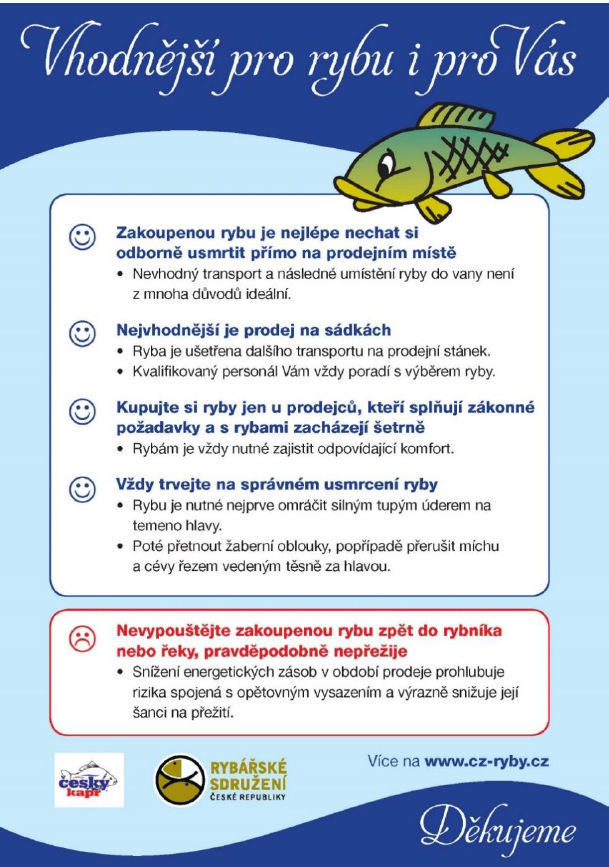
Tisková zpráva Rybářského sdružení ČR, 17. prosince 2024
Stánkový prodej živých kaprů před Vánoci je každoročně rezonujícím tématem, i proto se v tuto dobu hlasitě ozývají jeho zarytí odpůrci. Této příležitosti se rozhodly chopit některé zahraniční obchodní řetězce a naskočily na populistickou vlnu zákazu prodeje živých ryb před svými prodejnami s nabídkou jediné alternativy v podobě zpracovaných ryb. I přes vnucování svých názorů a mediální masáž ze strany aktivistů a některých zahraničních řetězců má český spotřebitel i nadále možnost svobodné volby, zdali pro štědrovečerní večeři upřednostní nákup živé nebo zpracované ryby.
Pro letošní vánoční prodej živých ryb je již vše připravenoPro tuzemský vánoční prodej ryb je stejně jako v minulých letech zajištěno dostatečné množství živých i zpracovaných ryb českého původu v požadované kvalitě, přičemž si každý zákazník může vybrat to, co mu nejlépe vyhovuje. Z hlediska jistoty je nejvhodnější nákup ryb přímo na sádkách či dalších prodejních místech rybářů, ať už z pohledu kvality, ceny, kvalifikovaného personálu či absence nadbytečných transportů a tím eliminace případných poranění ryb. Oficiální seznam všech aktuálních prodejních stánkových míst lze nalézt na
webu Státní veterinární správy, popřípadě je možné vybrat ze seznamu
stálých prodejců ryb. Je nutné připomenout, že ryby prodávané přímo z kádí a jejich usmrcování splňují podmínky platných právních předpisů, které Státní veterinární správa intenzivně a důsledně kontroluje. Mezi tato pravidla patří například umístění ryb ve vhodných podmínkách či omezení jejich zbytečného stresu například nevhodnou přepravou, manipulací či samotným usmrcováním.
Rybářské sdružení ČR přistupuje k problematice prodeje živých ryb dlouhodobě zodpovědně a konstantněZvýšené požadavky na šetrnou manipulaci s rybami vstupují do popředí nejenom v období Vánoc, ale i v průběhu celého roku. Proto je nutné dodržovat veškeré nastavené standardy zajišťující vhodný způsob prodeje a zároveň i zmiňované šetrné zacházení s rybou, minimálně tak, jak Rybářské sdružení ČR doporučuje všem zákazníkům v přiloženém letáku Vhodnější pro rybu i pro Vás. V žádném případě však nesdílí názor, že by měl být aplikován jakýkoliv zákaz prodeje živých ryb spotřebitelům.
Rybářské sdružení České republiky se tak důrazně vymezuje proti vedení všech negativních kampaní, podprahových manipulací či dokonce lživých tvrzení ve vztahu k prodeji tradičních vánočních kaprů se snahou jej poškodit. Tyto ataky pocházejí od určitých aktivistických skupin, jimi naverbovaných vědeckých pracovníků, politiků a také od některých obchodních řetězců. Spotřebitel je v případě zájmu o koupi živé ryby manipulován k využití vnitřních prostor prodejen, ve snaze docílit řetězení dalších prodejních aktivit včetně navýšení marží. Dle názoru některých obchodních řetězců je stánkový prodej živých ryb v dnešní době nepřijatelný, odporující z jejich pohledu odpovědnějšímu a ohleduplnějšímu udržitelnému přístupu k životnímu prostředí a zvířatům. Přitom deklarovaná kvalita produktu, dlouhodobá udržitelnost (především u mořského rybolovu), welfare (pohoda) zvířat, uhlíková stopa dovozu produktů rybolovu a akvakultury ze zahraničí včetně balení do jednorázových plastů a podobná tvrzení se jen těžko setkávají s realitou. V této souvislosti Rybářské sdružení ČR připomíná loňskou předvánoční aktivitu jednoho diskontního řetězce, kdy byl nabízen jako alternativa k zakázanému stánkovému prodeji živých ryb kapr chlazený či mražený původem z Polska, Chorvatska či dokonce z Ruska. Nejenže tyto produkty vykazovaly katastrofální kvalitu (více v TZ
ZDE), ale ryby původem pocházející z Ruské federace byly loveny destruktivními metodami, a to za použití tenatních sítí, přeposílány přes Kazachstán a nakonec zabaleny na Slovensku. Tudíž o nějakém odpovědném přístupu k životnímu prostředí, k udržitelnosti či k zvířatům nemůže být ani řeč. Ředitel Rybářského sdružení ČR Michal Kratochvíl k tomu dodává:
„Ryby přímo od českých producentů garantují čerstvost, kvalitu,krátký dodavatelský řetězec včetně dohledatelnosti původu a způsobu chovu, usmrcení v souladu s platnou legislativou i jejich následné zpracování, což nemusí u zpracovaných sladkovodních či mořských ryb z dovozu rozhodně vždy platit.“
Kontakt pro bližší informace: RNDr. Michal Kratochvíl, Ph.D., +420 608 943 339, This email address is being protected from spambots. You need JavaScript enabled to view it., Rybářské sdružení České republiky
O Rybářském sdružení České republiky
Rybářské sdružení ČR představuje rozhodující profesní organizaci produkčního rybářství v České republice, sdružující a reprezentující významné producenty v akvakultuře, zpracovatele ryb, instituce rybářského výzkumu a školství a také sportovní rybářské svazy. Členské subjekty vytvářejí 90 % tržní produkce ryb v ČR a hospodaří na zhruba 36 tis. hektarech rybniční plochy. Sdružení bylo založeno v roce 1991 a sídlí v Českých Budějovicích. V současnosti má 62 členů. Hlavním posláním je prosazování společných zájmů vůči orgánům státní správy, hospodářským, společenským zájmovým a jiným subjektům, zpracování údajů o produkci a obchodě ryb, statistiky zahraničního obchodu, propagace rybářství a další aktivity. Rybářské sdružení ČR prosazuje zájmy členských subjektů také na evropské úrovni, a to prostřednictvím Asociace evropských producentů ryb (FEAP), jejímž je dlouholetým členem.
Studenti Fakulty rybářství a ochrany vod (FROV JU) zorganizovali 20. listopadu ve studentském klubu Kampa, přímo v kampusu Jihočeské univerzity v Českých Budějovicích networkingovou akci „Aquaculture in Europe“.Cílem akce akce bylo propojení studentů akvakultury a podobných oborů napříč celou Evropou.
Lenka Kajgrová a Tomáš Pěnka, kteří zastupují Českou republiku ve studentské skupině Evropské asociace pro akvakulturu (EAS-SG), společně s Alžbětou Strouhovou a Anılem A. Tellbüscherem, pozvali na tuto neformální akci nejen studenty FROV JU, ale také vědce a další nadšence z Jihočeské univerzity, České zemědělské univerzity v Praze a Mendelovy univerzity v Brně. Cílem bylo představit mezinárodní rozměr akvakultury, inspirovat studenty k získávání zkušeností prostřednictvím zahraničních stáží a poskytnout jim kontakty, které jim mohou pomoci právě při získávání těchto zkušeností. Prvního ročníku této akce se zúčastnilo 15 hostů z České republiky a 11 hostů z dalších šesti evropských zemí. Členové EAS-SG využili pobyt v jižních Čechách také k účasti na třetím zimním workshopu EAS-SG, který se konal v Mezinárodním environmentálním vzdělávacím, poradenském a informačním centru pro ochranu vod (MEVPIS) ve Vodňanech.
Organizátoři děkují Jihočeské univerzitě v Českých Budějovicích a společnostem Sparos Lda a Pannonia Bio Zrt. za finanční podporu, díky níž se networkingová akce a workshop mohly uskutečnit. Poděkování patří také aktivním studentům FROV JU, kteří přispěli k hladkému průběhu workshopu.
Organizační tým:
- Anıl A. Tellbüscher (EAS-SG, zástupce Německa)
- Lenka Kajgrová (EAS-SG, zástupkyně České republiky)
- Tomáš Pěnka (EAS-SG, zástupce České republiky)
- Alžběta Strouhová (zástupkyně FROV JU, Česká republika)
How does the lateral line work? Do carp like dark chocolate? Why don't cave fish get lost in the dark and who is the biggest fish sniffer?
The theme of FROV JU's Easter Children's University, which took place on 28th–29th March, was the world of fish senses. The children took on the role of fish in a playful way and tried to perceive the world around them through their senses. They discovered why a fish called an archerfish needs keen eyesight or how the Ampullae of Lorenzini on a shark's head work. They also learned a lot about their own senses, created a message in Braille writing system and practiced their musical skills. The tutors rewarded the children's dedication and skills in completing the tasks with the discovery of a sweet treasure.
Twenty-four children took part in the Children's University, and two more camps, this time a full week, are planned for August to deal with climate change.
Written by: Miroslav Boček
The FFPW USB organized two children's universities (summer camps). The topic of the camps was insect. Over 50 children had the opportunity to know of the most numerous group of animals. The little students caught insects, examined them, drew them and released them back into the wild. They acquired insect superpowers and experienced many adventures in addition to knowledge.
We would like to thank to the organizers for great event and to children and their parent for participation and active involvement.
She is active and alert, but overcoming some barriers is beyond her. The Common barbel (Barbus barbus) is one of the original inhabitants of our rivers. This fish, like sturgeons and asp, needs free movement in the water to live and reproduce. However, migration barriers, in the form of dams, dykes and other concrete structures on watercourses, make it difficult to move naturally in rivers.
The Common barbel is a fish that moves through different parts of the river during its life to find suitable conditions for breeding, growing or wintering. Unfortunately, the migration routes it uses to do this are increasingly blocked. In Slovakia alone, almost 1 500 known barriers cross rivers, up to 80% of which prevent fish from migrating. This has resulted in a decline in the abundance of parma and other native fish species, as well as a general disruption of river ecosystems.
Telemetric monitoring as a conservation tool
Within the LIFE Living Rivers project, important activities are taking place on four Slovak rivers. One of them is the Danube, in whose waters experts are monitoring the movements of several native fish species, including the common parma.
In April 2024, telemetric monitoring was launched on a 97kilometre stretch of the Danube by a research team from the Faculty of Fisheries and Protection of Waters of the University of South Bohemia (FFPW USB) led by Dr. Bořek Drozd in coordination with the Slovak Fishermen's Association. While in the initial phase the scientists focused mainly on monitoring small sturgeon, now it is also the turn of the common barbel. At the end of October, the experts fished 50 specimens out of the Danube waters, which were implanted with small transmitters by a veterinarian. The fish were then released back into the Danube.
Telemetry devices will allow experts to track the barbel's onward journey through the river. As well as providing scientists with valuable information about their location, even the temperature or depth of the water they swim in, they will also help them detect problematic stretches of the Danube and identify the migration obstacles that make their lives most difficult. The results of the research will also help to design appropriate measures to make the water structures that prevent fish from migrating more accessible.
The future of rivers and the Common barbel
Healthy and flowing rivers are an integral part of our environment and the landscape we share. In addition, they provide shelter for many animals not only under the water surface but also in their surroundings. Protecting parma and other fish species is an important step towards promoting biodiversity and stability in our aquatic ecosystems. The LIFE Living Rivers project envisages the restoration of migration corridors that will allow fish to move freely through rivers to fulfil their role in freshwater ecosystems.
If the conditions for fish migration can be improved, this will be a success not only for the fish themselves, but also for the whole river communities that are an integral part of our nature.
More information here and here.

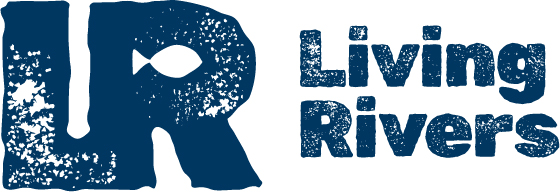
- Fotogalerie:
- Foto:
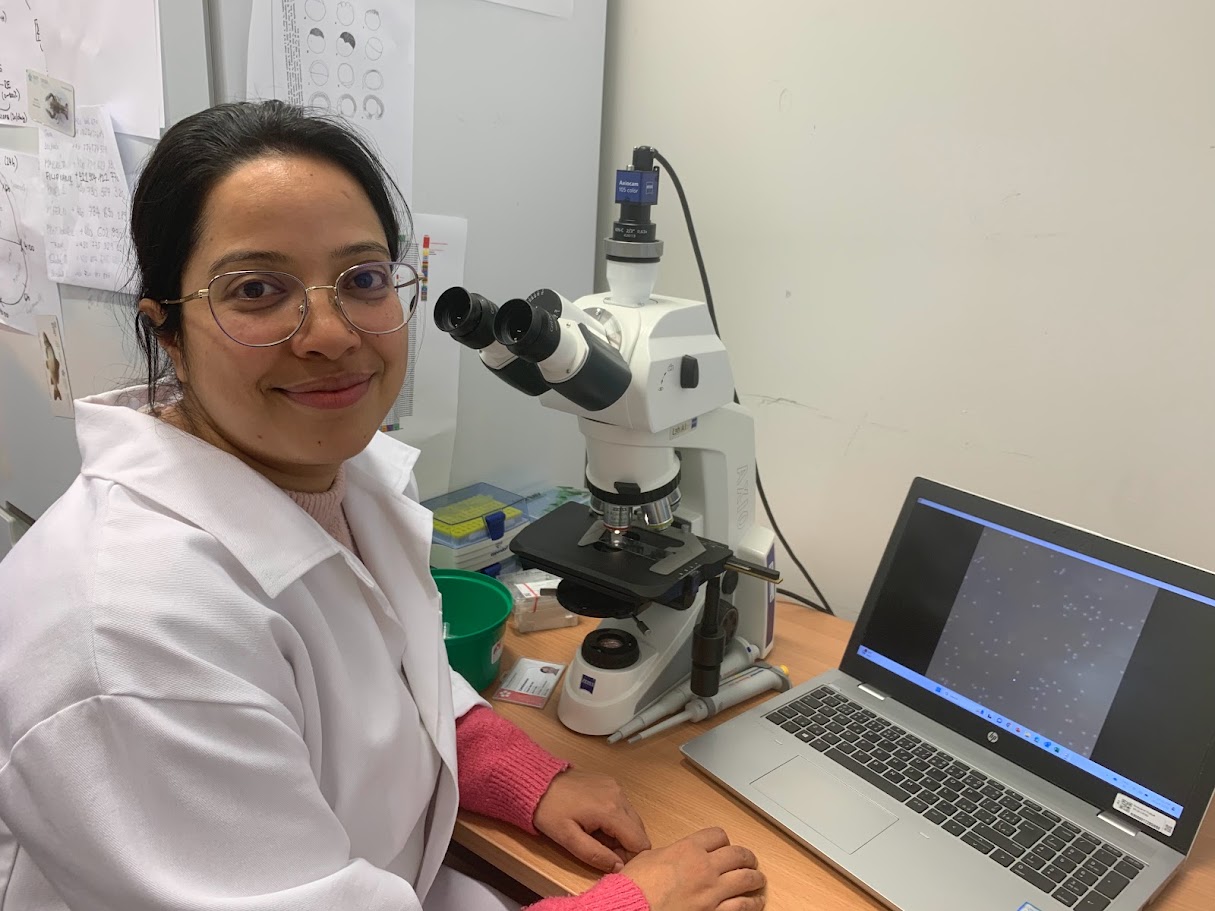
A newly published review article investigates the pivotal role of long-chain polyunsaturated fatty acids (LC-PUFAs) like arachidonic acid (ARA), eicosapentaenoic acid (EPA), and docosahexaenoic acid (DHA) in fish sperm. These fatty acids are more than structural components; they significantly influence sperm biomechanics and physiology, including motility, rheotaxis, and fertilization efficiency.
The study explores how LC-PUFA profiles in fish sperm are shaped by evolutionary pathways, dietary inputs, and biomechanical demands. It highlights the unique role of DHA in enhancing sperm functionality through its superior membrane fluidity, fusogenic properties, and resilience to biophysical stress. In addition, the role of ARA and EPA-derived eicosanoids in sperm inflammation and chemotaxis was revealed, suggesting an intricate balance between evolutionary adaptation and environmental influences.
The findings emphasize the need for careful consideration of dietary inputs in aquaculture, particularly for broodstock fish, to mitigate unintended impacts on sperm quality and downstream progeny fitness.
Detailed information can be found in the original review article: Rahi Roy, D., Roy, K., Panserata, S., Stejskal, V., Mráz, J., Turchini, G.M., 2024. Long chain polyunsaturated fatty acid (LC-PUFA) composition of fish sperm: nexus of dietary, evolutionary, and biomechanical drivers. Progress in Lipid Research 96, 101305. https://doi.org/10.1016/j.plipres.2024.101305
This review is a collaborative effort between the University of South Bohemia in České Budějovice, Faculty of Fisheries and Protection of Waters, Université de Pau et des Pays de L'Adour, and the University of Melbourne, bridging research across continents to provide new insights into fish reproduction in aquaculture practices.
Fig. 1: Microscopic monitoring of fish sperm motility.
Fig. 2: Sperm collection from crucian carp (Carassius carassius).
From August 26th to 30th 2024, a delegation from the Faculty of Fisheries and Protection of Waters of the University of South Bohemia participated in the scientific conference AQUA 2024, organized under the auspices of the World Aquaculture Society (WAS) and the European Aquaculture Society (EAS). The conference was held at the Bella Center in Copenhagen, Denmark. The Faculty of Fisheries and Protection of Waters was represented at this event by a total of 23 participants, including scientific and academic staff, PhD students, and students from the master's program "Fisheries and Protection of the Waters." The FFPW USB representatives presented a total of 12 oral and 6 poster contributions at AQUA 2024. These presentations and posters covered topics such as precision farming, RAS, ponds, broodstock management, selective breeding, early life, fish and crustacean nutrition, feed additives, non-native fish species, fish population monitoring, scientific collaboration, training and education, and more. Master’s program students played a significant and active role under the guidance of organizers from the EAS student section in the organization of participant registration and individual conference sections. During the traditional Trade Show, FFPW showcased its own booth with promotional, professional, and scientific materials. This event significantly contributed to the promotion of the faculty and the CENAKVA center, offering their open infrastructure access to the international scientific community. We believe that this activity will enable further scientific and educational connections between FFPW USB, CENAKVA, and other research institutions abroad.
Skvělé! Jsme rádi, že se chystáte do ABC Challenge 2024zapojit. Tak nezapomeňte, JU se bude výzvy účastnit v ČERVNU 2024. Academic Bicycle Challenge je cyklistická soutěž pro univerzity a vysoké školy z celého světa, která pomáhá nejen ke zvýšení mezinárodní prestiže zapojených univerzit, ale především propaguje zdravý životní styl. (PRAVIDLA)
Po celý měsíc tak můžeme dát šanci pohybu, prospět zdraví a životnímu prostředí, zasoutěžit si a co víc - přispět lidem a rodinám s dětmi s autismem. Všechny najeté kilometry se počítají a podpoří celkový výsledek JU, ať už budete na kole jezdit jen pro zábavu nebo z jakéhokoliv jiného důvodu.
NOVINKY PRO ROČNÍK 2024
Skvělé ceny
CYKLISTICKÉ DRESY JU od firmy KALAS již v průběhu soutěže (od 1. 6.) - pro prvních 60 jezdců (30 žen a 30 mužů), kteří ujedou 150 km (upřesnění v pravidlech níže)
Jako hlavního vítěze ABC 2024 vyhlásíme nejlepšího jezdce, jezdkyni a nejlepší tým, a máme pro ně připraveny super dárky:
- POUKAZY NA MASÁŽ A MĚŘENÍ ZDRAVOTNÍCH PARAMETRŮ pro nejlepšího jezdce a jezdkyni ABC 2024
- INBODY DIAGNOSTIKU pro vítězný tým
- CYKLISTICKÉ POHÁRY
- BALÍČEK PRAKTICKÝCH CYKLISTICKÝCH PŘEDMĚTŮ na kolo včetně cestovní lékárničky
A pokud tohle ještě nebude stačit, přidáme i něco DOBRÉHO K PITÍ (balení piva Budvar a Čtyrák)
Studentská výzva
STUDENTI POZOR! I vaše účast je pro nás důležitá, zapojte se a využijte tak šanci porazit své profesory ߘꮠMáme pro vás připravenou osobní výzvu Rektora JU - pokud zvítězí studentský tým, získá „SUD“ PIVA (více v pravidlech níže)
Novinky v pravidlech JU
- Nejdůležitější novinkou v pravidlech pro ABC 2024 je přihlášení všech jezdců do Naviki přes UNIVERZITNÍ EMAIL(pokud již účet máte, email lze snadno změnit).
- Pro týmy: v tomto ročníku bychom chtěli, aby týmy byly co nejvyrovnanější, proto Vás prosíme o co nejvyšší možné naplnění týmů do maxima (25 jezdců). Týmy mohou být složeny z jezdců z různých útvarů, oblastí, typů studia či po fakultách. Prosíme, vyzvěte své kolegy a kamarády a spojte své síly dohromady pro dobrou věc.
- NÁZEV TÝMU musí být zadán tak, aby co nejlépe reprezentoval danou fakultu, součást JU či skupinu (přesné specifikace v pravidlech níže).
SOUHRNNÁ PRAVIDLA, SPECIFIKACE PRO TÝMY - ZADÁNÍ NÁZVŮ
Děkujeme také za podporu našim partnerům: BUDVAR, ČEZ, ČSOB, KALAS
A nezapomeňme, Jihočeský kraj je opravdovou láskou pro všechny kategorie cykloturistiky s rozsáhlou sítí značených cyklostezek a České Budějovice aktivní cyklistické město, pro které je ochrana přírody důležitá. Jihočeská univerzita je jeho součástí a my jsme připraveni naši aktivitu ukázat celému světu.




V případě jakýchkoliv dotazů se obraťte na Mgr. Dianu Kocábkovou jako kontaktní osobu na This email address is being protected from spambots. You need JavaScript enabled to view it.
On November 20th, “Aquaculture in Europe”, a networking event organised by students from the Faculty of Fishery and Protection of Waters (FFPW) took place at the Student Club Kampa on the University Campus of the University of South Bohemia in České Budějovice.
Lenka Kajgrová and Tomáš Pěnka, who are the Czech country representatives in the European Aquaculture Society - Student Group (EAS-SG), Alžběta Strouhová and Anıl A. Tellbüscher invited FFPW students, scientists, and also interested students from Prague and Brno to attend an informal event where they had the chance to get in touch with aquaculture students from other European institutions. The aim was to provide a glimpse into the international dimension of aquaculture, to motivate students to broaden their horizons by going abroad for an internship and to provide them with the right contacts to do so.
15 guests from the Czech Republic and 11 guests from 6 other EU countries were welcomed during the first edition of this event. The EAS-SG members made further use of their stay by attending the 3rd (EAS-SG) Winter Workshop, which took place at the International Environmental Education, Advice and Information Centre for Water Protection (MEVPIS) in Vodňany.
The organisers would like to thank the University of South Bohemia and the companies Sparos Lda, Pannonia Bio Zrt. for their financial support, without which the networking event and workshop could not have been possible. Last but not least, thank you to all the active students of FFPW USB who contributed to the smooth running of the workshop.
Organizing Committee:
- Anıl A. Tellbüscher (EAS-SG Country representative Germany)
- Lenka Kajgrová (EAS-SG Country representative Czech Republic)
- Tomáš Pěnka (EAS-SG Country representative Czech Republic)
- Alžběta Strouhová (Representative of FFPW USB, Czech Republic)
The CENAKVA Center is actively involved in the European DANUBIUS-RI consortium, providing unique services through our research programs VP1, VP2, and VP3.
The DANUBIUS-RI consortium, through its pilot call (DANUBIUS-IP project 101079778), focuses on early-career researchers and Ph.D. students addressing the theme of ‘Water, sediment and biotic variations and their impacts on aquatic ecosystems in River-Sea Systems under extreme events and climate change scenarios.’
The facilities and services of the CENAKVA center are used within the framework of two research projects that have passed the evaluation process of the first pilot call, which aims to test operational services in ‘real-world’ research scenarios.
Project 1: Evaluating the ecological benefits of upgrading to advanced wastewater treatment in freshwater river ecosystems (WW-IMPACT)
Project 2: Tire additives in road runoffs: monitoring and toxicity assessment within river-sea systems
Details of the projects and the full article are available here.
The newsletter can be accessed here.
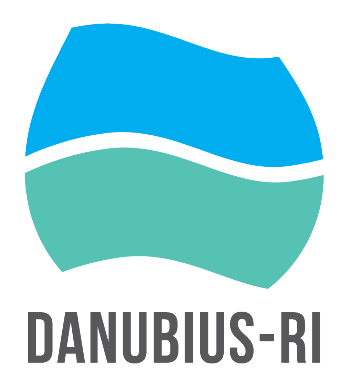
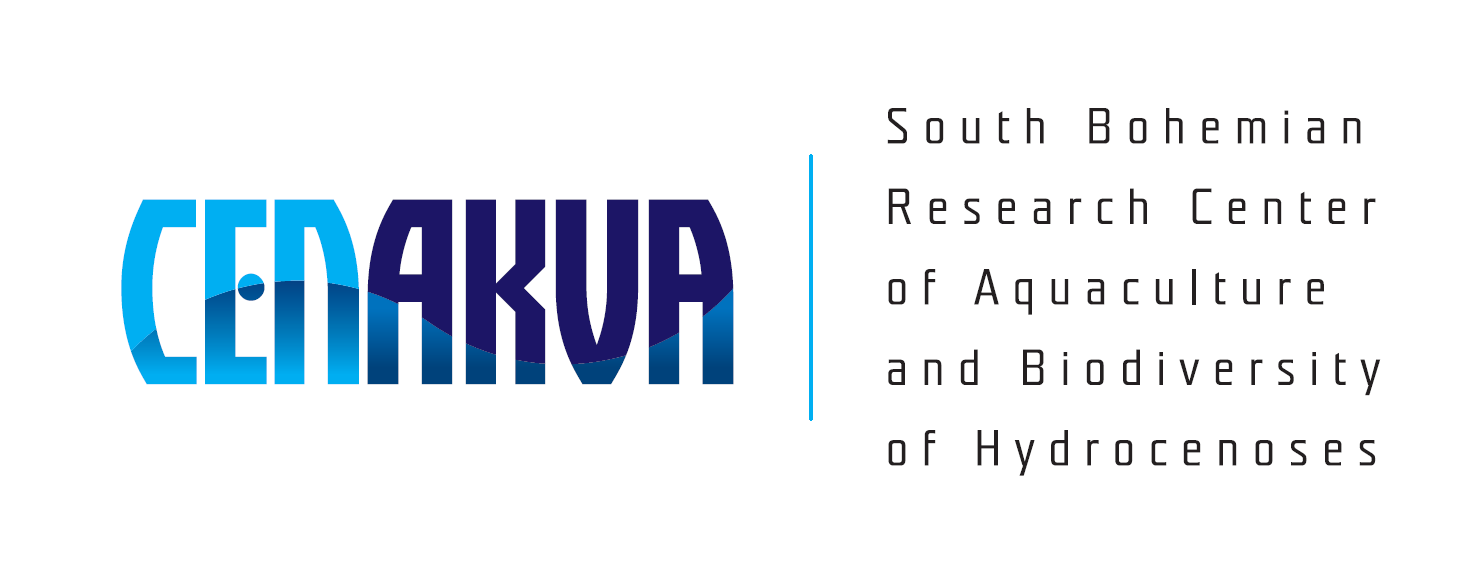
DANUBIUS-IP is an EU Horizon Europe project funded by the European Union (HORIZON-INFRA-2021-DEV-02) under grant agreement No 101079778.
Děkan FROV JU prof. Ing. Tomáš Policar, Ph.D. se v pátek 3. 5. 2024 sešel v Českých Budějovicích s doc. Ing. Petrem Hartvichem, CSc. a dodatečně mu poblahopřál k významnému životnímu jubileu a to k 80. narozeninám. Setkání se neneslo jen v duchu vzpomínek na časy minulé, ale došlo i na odbornou debatu o rybích přechodech, provozu vodních elektráren na tocích v ČR a nutnosti neustále aktivně se zasazovat o dodržování minimálních průtoků na tocích s cílem efektivně chránit naši ichtyofaunu, původní druhy raků a mlžů.
Doc. Ing. Petr Hartvich, CSc. v letech 1994–2009 založil a dlouhodobě vedl Rybářskou specializaci a následně obor a katedru Rybářství na Zemědělské fakultě (ZF) Jihočeské univerzity v Českých Budějovicích (JU). Výzkumný ústav rybářský a hydrobiologický ve Vodňanech JU společně se zmíněnou katedrou Rybářství ZF JU v roce 2009 přispěly ke vzniku Fakulty rybářství a ochrany vod (FROV) JU. Kolega doc. Ing. Petr Hartvich, CSc. je i v současnosti neustále odborně aktivní při různých konzultacích s kolegy na FROV JU v Českých Budějovicích, pracovníky Rybí líhně NP Šumava v Borové Ladě a také je aktivním členem Odborné skupiny - komise pro rybí přechody pod Agenturou ochrany přírody a krajiny ČR.
Tímto ještě jednou přejeme kolegovi doc. Ing. Petru Hartvichovi, CSc. vše nejlepší, hodně zdraví, štěstí a životní pohody do další let a těšíme se na další osobní setkání třeba ve Vodňanech při plánované celoústavní schůzi 20. června tohoto roku.
Ve čtvrtek 21.3.2024 navštívila naší fakultu desetičlenná ministerská delegace z Ghany a to konkrétně z ministerstva Rybářství a Rozvoje Akvakultury (Ministry of Fishery a Aquaculture Development) vedené náměstkyní ministryně Marian W. Kpakpah a velvyslankyní Ghany v ČR paní Doris A. D. Brese (Embassy of the Republic of Ghana). Návštěvy si velice vážíme a věříme, že se nám podaří navázat dlouhodobou spolupráci a přivítat na naší fakultě studenty z této zajímavé africké země.
Our faculty visited a ten-member ministerial delegation from Ghana, specifically from the Ministry of Fisheries and Aquaculture Development, led by Deputy Minister Marian W. Kpakpah and Ambassador of Ghana to the Czech Republic, Mrs Doris A.D. Brese (Embassy of the Republic of Ghana) on Thursday, March 21, 2024. We greatly appreciate the visit and believe that we will be able to establish long-term cooperation and welcome students from this interesting African country to our faculty.
- Fotogalerie:
- Foto:
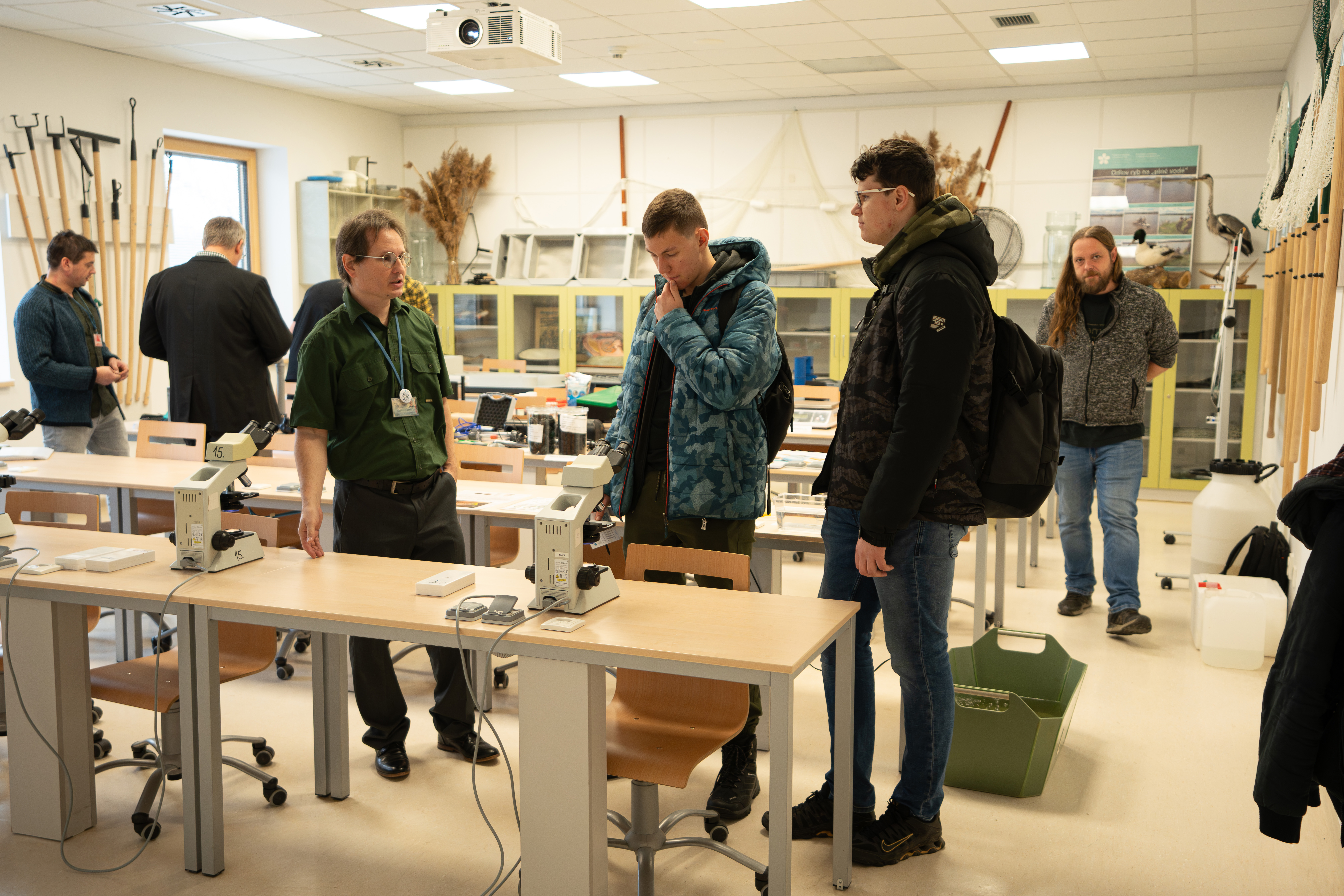
- Foto:
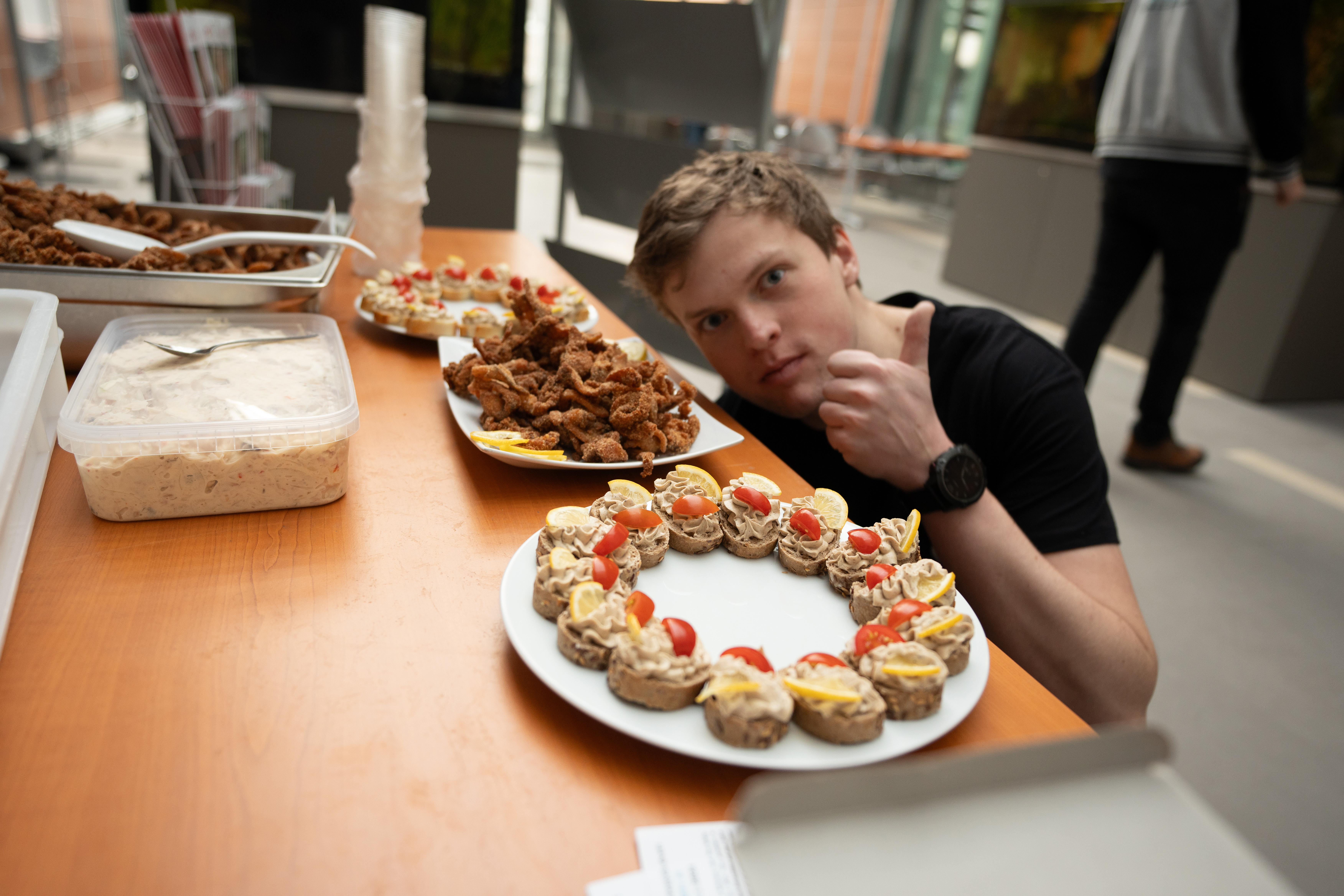
- Foto:
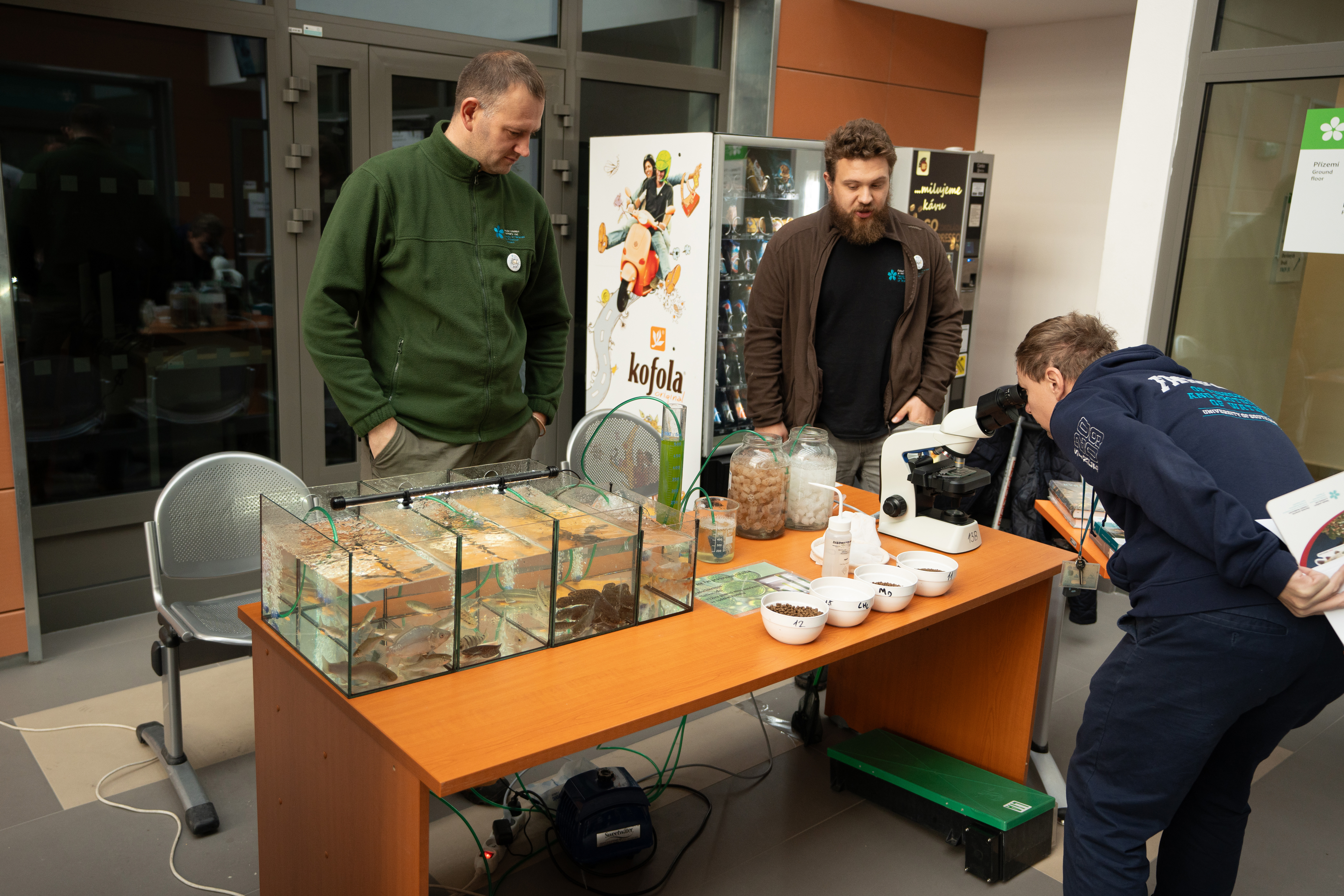
- Foto:
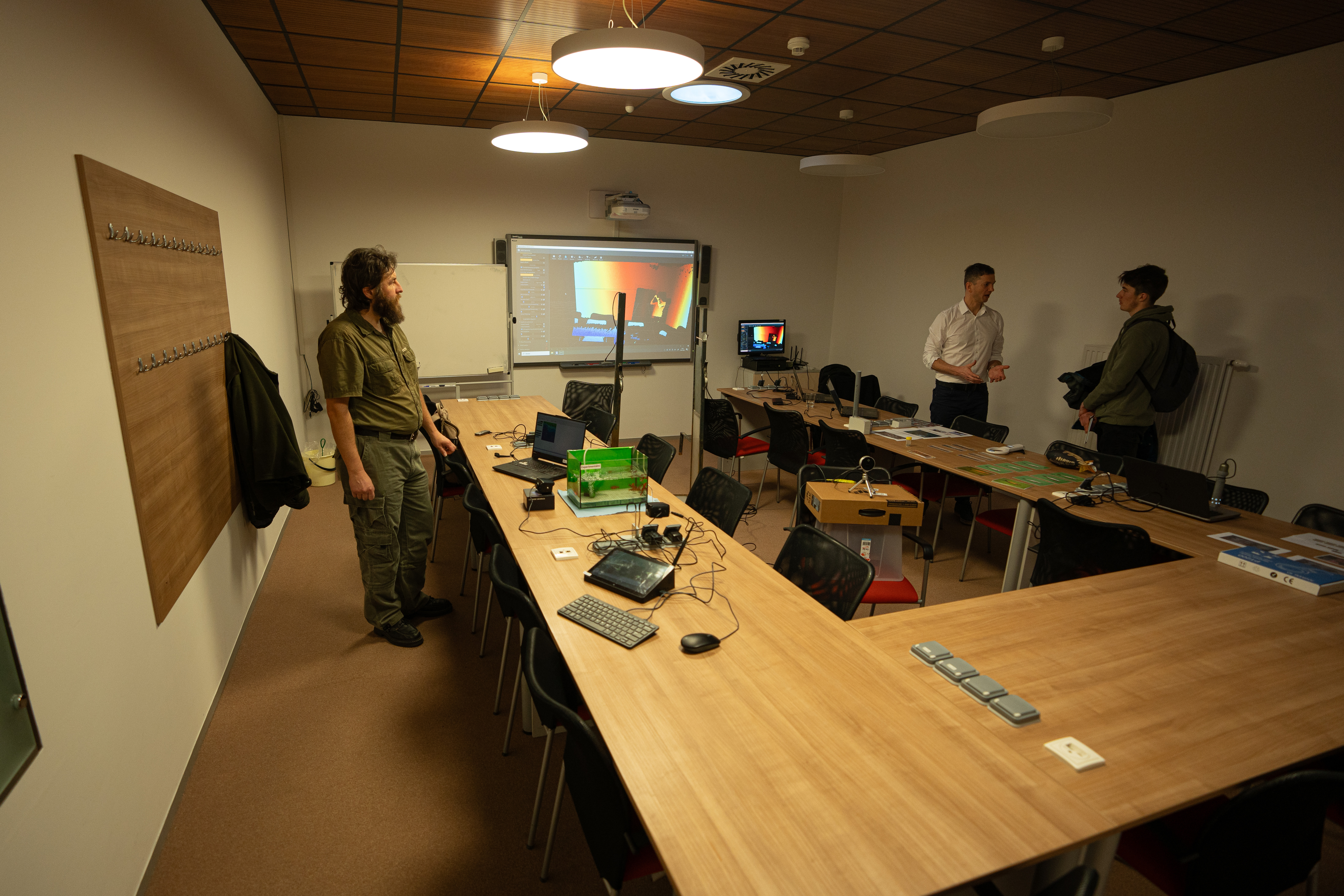
- Foto:
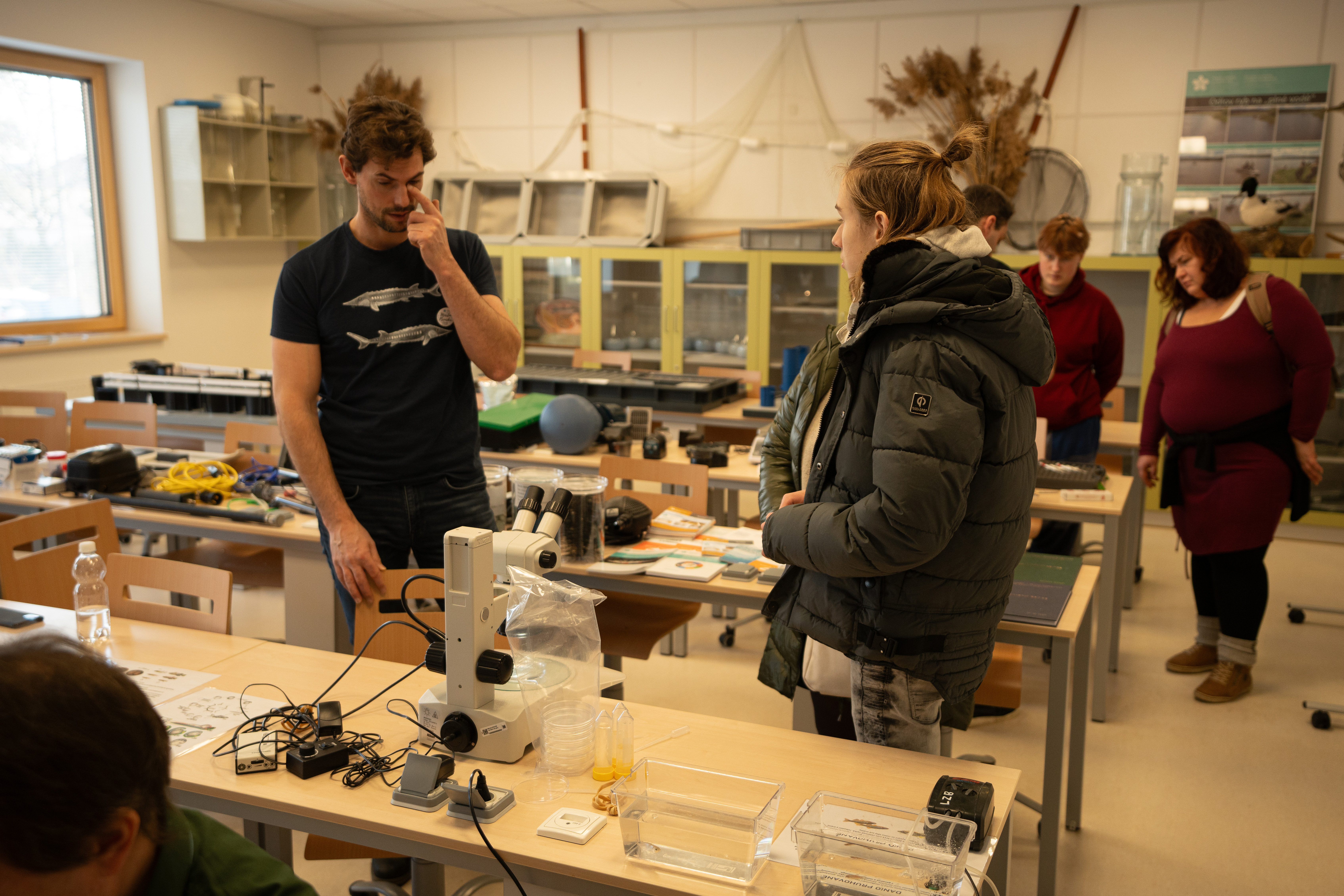
- Foto:
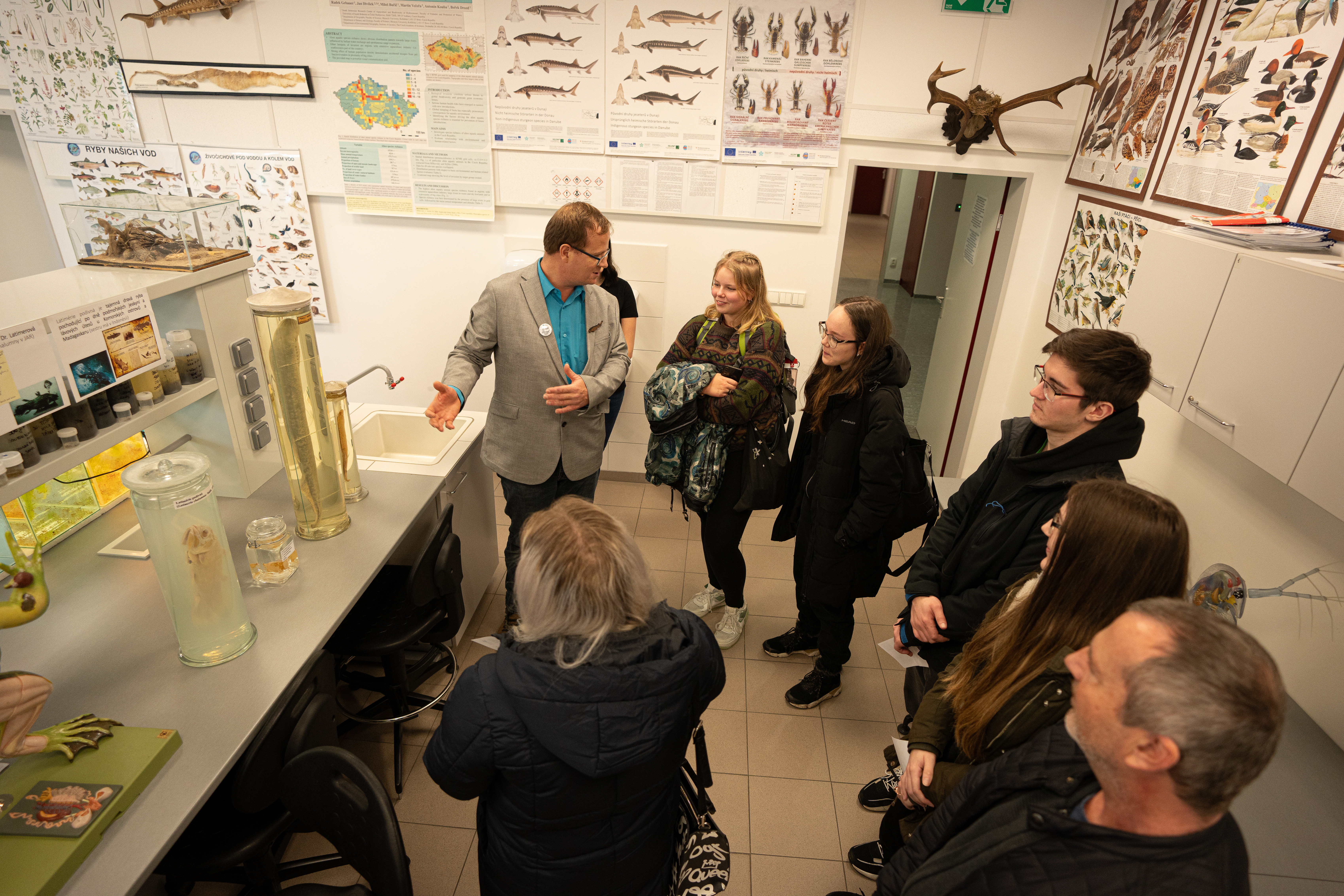
- Foto:
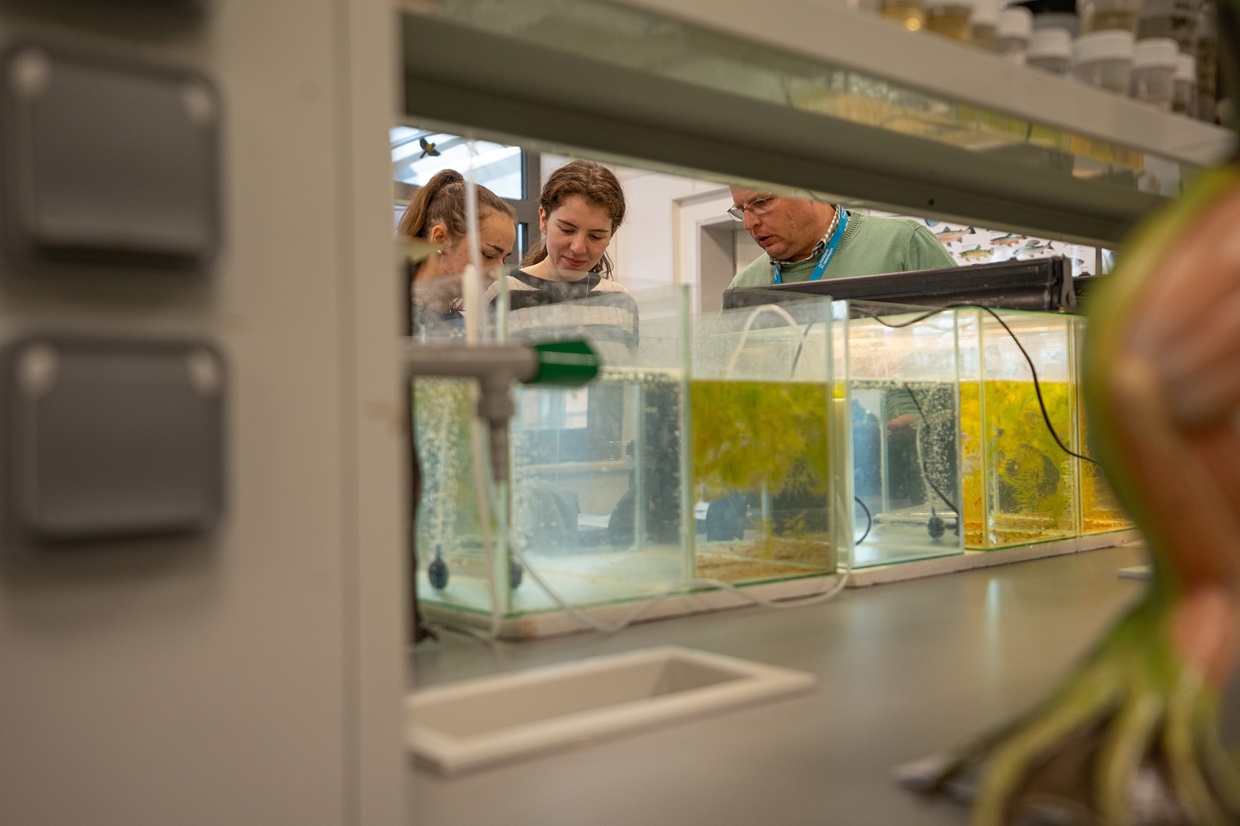
- Foto:
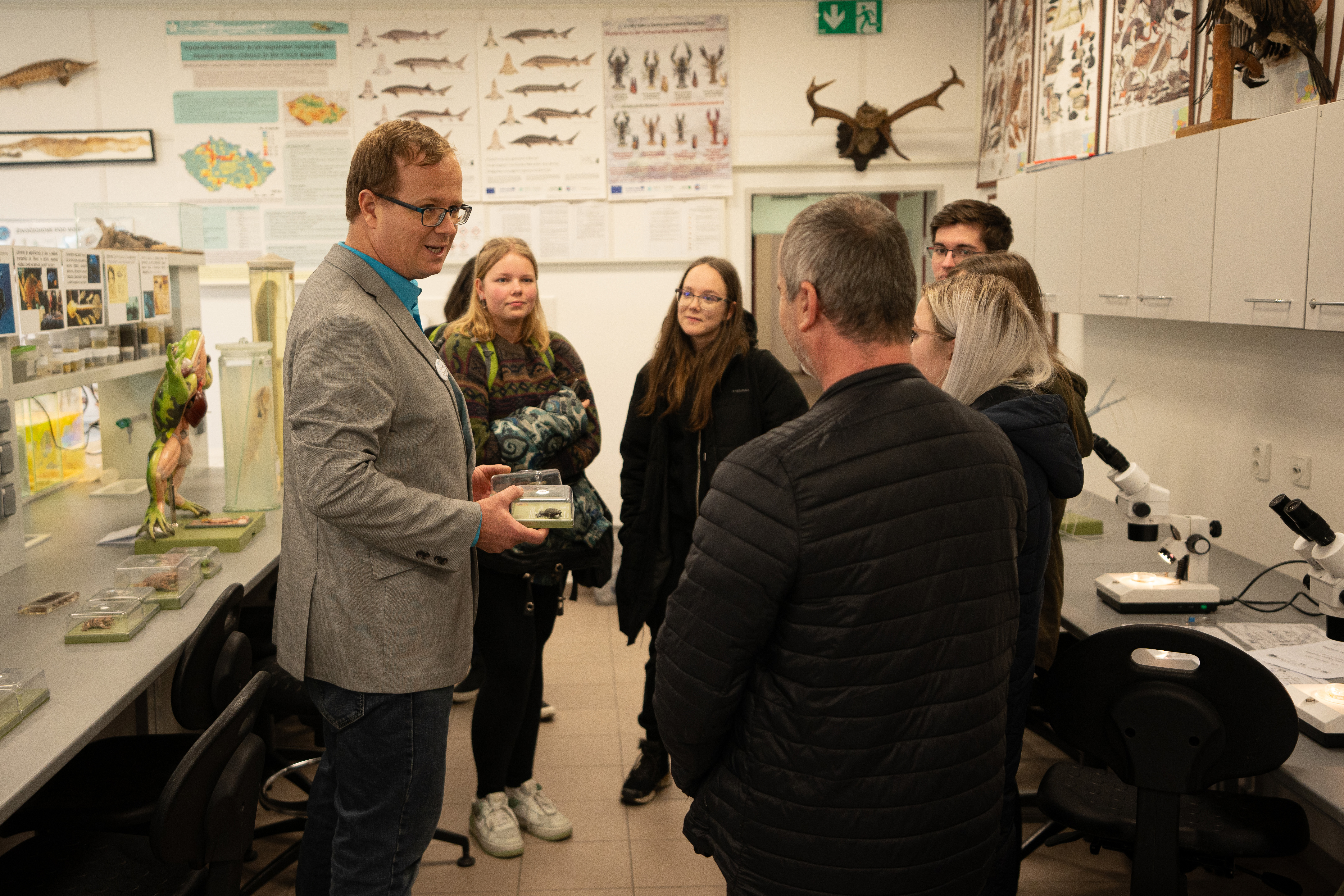
V pátek 19. ledna 2024 se otevřely dveře všech součástí Jihočeské univerzity v Českých Budějovicích. Zájemci o studium měli možnost na vlastní kůži zažít také naši fakultu.
V budově ZR, přímo v kampusu univerzity byl pro všechny návštěvníky připraven bohatý celodenní program, který reprezentoval zaměření fakulty. V rámci tohoto programu si zájemci mohli vyzkoušet mikroskopické techniky využívané nejen při studiu reprodukce ryb, prohlédnout si modely vodních organismů i živé ryby či se dozvědět o aplikaci moderních technologií v rybářství. Program fakulty navštívilo zhruba 50 zájemců o studium.
Děkujeme všem zaměstnancům i studentům, kteří se na přípravě Dne otevřených dveří aktivně podíleli.
A pokud jste se k nám nemohli podívat osobně, stále máte možnost si naše budovy prohlédnout alespoň prostřednictvím 3D prohlídek.








